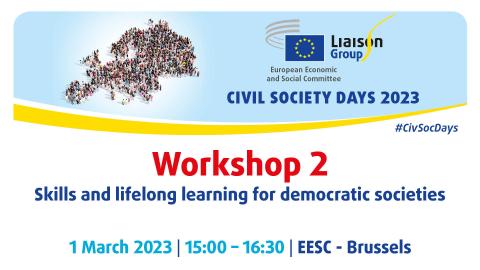European Economic
and Social Committee
Workshop 2: Skills and Lifelong Learning for Democratic Societies
1 March 2023 - 15.00 – 16.30 • Room JDE 62
- Organised by: The Lifelong Learning Platform - European Civil Society for Education (LLLP), the European Association of Institutes for Vocational Training (EVBB) and Cooperatives Europe, in cooperation with the EESC Section for Employment, Social Affairs and Citizenship (SOC)
- Moderated by: Theodor Grassos, Secretary General of EVBB
Related opinions
- SOC/749 European Year of Skills
- SOC/663 Promoting skills for a more just, cohesive, sustainable, digital and resilient society
- SOC/637 Updated skills agenda
- SOC/636 Towards an EU strategy for enhancing green skills and competences for all
The Lifelong Learning Platform
https://www.menti.com/algipcg1w9f4
Draft Agenda:
- 15:00 Words of welcome
- Raffaela Kihrer, Vice President of the Lifelong Learning Platform
- 15:10 Panel discussion
- Dr Nazik Beishenaly, KU Leuven
- Tatjana Babrauskiene, Member of the EESC
- Carlo Scatoli, Senior Expert, Unit Skills Agenda, Directorate Skills and Jobs, Directorate General for Employment, Social Affairs and Inclusion, European Commission
- 16:00 Interactive session
- 16:20 Wrap-up
- Astri Liland – Cooperatives Europe board member and Head of competence and training at the Norwegian Agriculture Cooperatives association (Norsk Landbrukssamvirke)
- 16:30 End
Concept note
Surfing the wave of a fast-paced and ever-changing reality, the European Commission has officially announced that 2023 will be the European Year of Skills. This decision stems from the need to address the mismatch between employment needs and education sectors, but it reveals a vision that positions education as the sparring partner of the labour market. Through this workshop, civil society organisations want to highlight how, from the life course perspective, education, training and transversal skills are the way forward for Europe. There are skills, competences and attitudes that ultimately enable people to find fulfilment in their lives and adapt to fast-paced changes. At times when attention is more diverted towards the twin transitions or the energy crisis, the EU must not forget the existing threats to democratic values which have been resurging across Europe. Skills, whether vocational or social, technical or key competences, help individuals of all ages cope with current crises and make them more conscious about their potential in society. This, in turn, enhances democratic participation and strengthens both communities and social life.
Transversal skills and key competences such as critical thinking, problem-solving and digital literacy cut across sectors, fields, tasks, eras and lives. When modernising education and training systems, it is crucial to adopt a lifelong learning approach and introduce reforms in a holistic manner in order to build truly inclusive and sustainable learning societies. Equipping learners with the necessary transversal skills to navigate modern seas is a fundamental endeavour for all education sectors. In the spirit of implementing the key competences for lifelong learning, this workshop seeks to explore the many ways in which these attitudes enhance democratic life in Europe.
Work organisation
Downloads
-
WS 2 Skills and lifelong learning for democratic societies - Report
